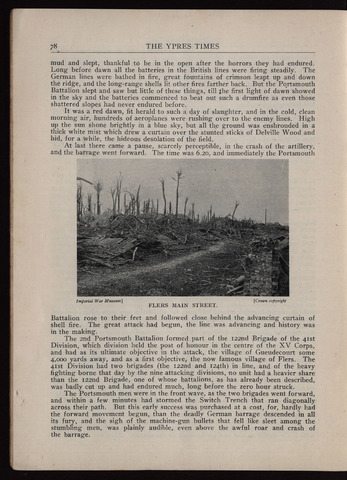78 THE YPRES TIMES
mud and slept, thankful to be in the open after the horrors they had endured.
Long before dawn all the batteries in the British lines were firing steadily. The
German lines were bathed in fire, great fountains of crimson leapt up and down
the ridge, and the long-range shells lit other fires farther back. But the Portsmouth
Battalion slept and saw but little of these things, till the first light of dawn showed
in the sky and the batteries commenced to beat out such a drumfire as even those
shattered slopes had never endured before.
It was a red dawn, fit herald to such a day of slaughter, and in the cold, clean
morning air, hundreds of aeroplanes were rushing over to the enemy lines. High
up the sun shone brightly in a blue sky, but all the ground was enshrouded in a
thick white mist which drew a curtain over the stunted sticks of Delville Wood and
hid, for a while, the hideous desolation of the field.
At last there came a pause, scarcely perceptible, in the crash of the artillery,
and the barrage went forward. The time was 6.20, and immediately the Portsmouth
Imperial War Museum[Crown copyright
FLERS MAIN STREET.
Battalion rose to their feet and followed close behind the advancing curtain of
shell fire. The great attack had begun, the line was advancing and history was
in the making.
The 2nd Portsmouth Battalion formed part of the 122nd Brigade of the 41st
Division, which division held the post of honour in the centre of the XV Corps,
and had as its ultimate objective in the attack, the village of Gueudecourt some
4,000 yards away, and as a first objective, the now famous village of Flers. The
41st Division had two brigades (the 122nd and 124th) in line, and of the heavy
fighting borne that day by the nine attacking divisions, no unit had a heavier share
than the 122nd Brigade, one of whose battalions, as has already been described,
was badly cut up and had endured much, long before the zero hour struck.
The Portsmouth men were in the front wave, as the two brigades went forward,
and within a few minutes had stormed the Switcli Trench that ran diagonally
across their path. But this early success was purchased at a cost, for, hardly had
the forward movement begun, than the deadly German barrage descended in all
its fury, and the sigh of the machine-gun bullets that fell like sleet among the
stumbling men, was plainly audible, even above the awful roar and crash of
the barrage.

